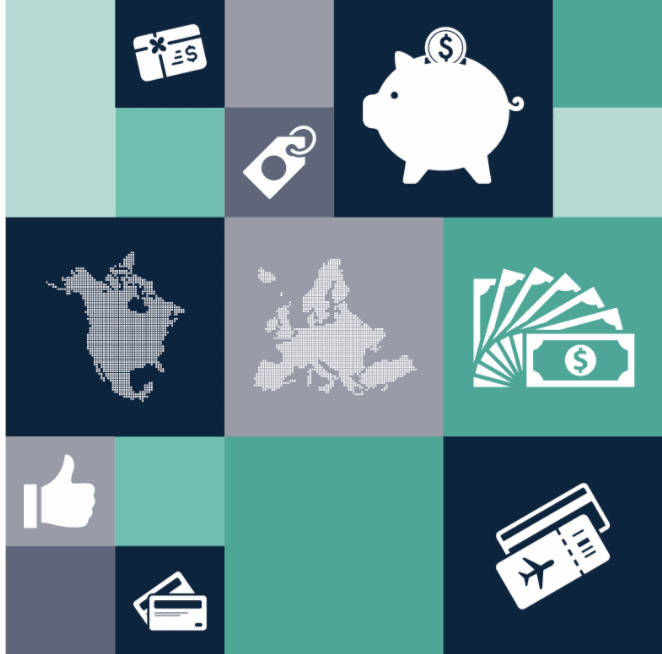The incentive outlook for 2022, including merchandise, gift cards and incentive travel, is one of economic optimism, according to a new IRF Outlook Study. Among the elements on the upswing for 2022 are overall incentive program budgets, the use of third parties and incentive houses, and the amount companies plan to spend per-person for 2022 incentives and rewards.
The latest Outlook Study for the Incentive Research Foundation (IRF), which for the first time included European participants as well as those in North America, found a number of key indicators for a healthier incentive environment in the coming year, although there are still some COVID-related caveats.
Among the key findings from the IRF incentive outlook study:
- Incentive program budgets are expected to increase significantly in 2022. In North America, 34% said their overall budgets are forecast to increase in 2022, up from the 7% predicted this time last year for 2021 budgets. Thirty percent said their merchandise budgets are expected to increase, up from 12% in 2021, while 38% said gift cards will be hot commodities for 2022. Thirty-five percent also said the number of participants for their North American programs are projected to grow next year, compared to just 9% last year.
Budgets increases are even hotter in Europe, with 44% of European respondents saying they were expecting a big increase for 2022 in their overall budgets. Merchandise was expected to grow for 42%, while 40% expected to see a rise in the use of gift cards. European respondents also expected a big rise in the number of participants earning a reward, with 45% reporting a positive net change for the new year.
- Companies will be using third parties more — and spending accordingly. After a contraction of -8% for 2021, 27% of North American respondents said they planned to use third-party planners and/or incentive companies in 2022, with 33% adding that they anticipated increasing their budgets for third parties upward.
- Per-person non-cash reward and recognition program spending are on the upswing. The average per-person spend for non-cash reward and recognition programs jumped from $764 in 2021 to $806 for 2022. And more than half said they planned to spend more than $250 per person, up from just 41% who said the same for 2021.
- Event gifting budgets heading up. While spending on event gifting has declined since 2019 in median and average spend, as well as spending on speakers and VIPs, the good news is that event gift budgets are expected to increase significantly in 2022. Forty-five percent of North American respondents said they expected to see net increases in their event gifting budgets, as did 58% of European respondents.
- Public perceptions increasingly are affecting non-cash program design. The net importance of public perception on non-cash program design took a big leap in 2021, from 44% to 73% in North America, perhaps because “employers are trying desperately to attract talent and having strong reward and recognition programs certainly help in this regard,” according to the IRF report. The only time public perception registered as such an important factor previously was after the Great Recession in 2008, though at that time it had negative connotations, rather than the positive ones IRF posits this time around. The net score was even higher in Europe, at 81% for 2021. Keeping up with the Joneses also heated up this year, with 67% of North American respondents saying they were taking competitor programs into consideration when designing their programs, up from 39% last year.
Incentive Outlook: Economic Considerations Still Key
The incentive outlook study also found that 78% of the total 481 respondents expect their company to have an incentive-worthy financial performance in 2022. In the previous year’s study of just North American corporate, third-party and supplier incentive professionals, only 64% thought their company would have a strong financial performance in 2021. North American respondents extended that overall economic optimism to the U.S. economic outlook as a whole, which about two-thirds said they believed would be strong in 2022, compared to just half who said the same before flipping the calendar from 2020 to 2021.
Weirdly, while North Americans expressed optimism about their own company’s economic outlook and the overall economy for the coming year, they weren’t nearly as gung-ho about how that booming economy would affect non-cash reward planning and execution. The net score for third-party planners ended up in the negative zone — -4% — on a question about how the economy will impact non-cash reward programs.
IRF speculates that this could be a reflection of COVID fatigue — third-parties who were optimistic at this time last year when vaccines seemed to signal the beginning of the end of the pandemic may have had their hopes dashed as the rise of the delta, and now omicron, variants began having a negative effect on incentive programs in 2021. There also were big increases in merchandise and gift card program cancellations in 2021 — up 44% in North Amerrica and 66% in Europe. The question didn’t ask about any travel program cancellations, although that is open to speculation, according to the IRF.
North American corporate clients and European respondents in general were more optimistic than their third-party peers, with net scores of +25 and +40, respectively.
The needle didn’t move much when it comes to optimism toward the regulatory environment, despite the changing of the majority from the regulation-averse policies of the Trump administration to a generally more regulatory-friendly Biden administration. Just 22% of North Americans expressed optimism toward that regulatory environment in last year’s study, compared to 20% of those surveyed this fall.
You Might Also Be Interested In
The Latest Trend in Corporate Gift and Amenity Experiences: High-end Retailers
Incentive Success: 5 Top Tips on How to Create Hyperlocal Experiences
Corporate Gifts Returning for In-Person Incentives











